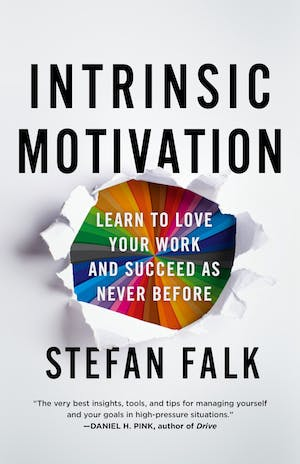When you’re really ready to maximize your work performance, read “Intrinsic Motivation”

I once met and briefly worked with an amazing man named Stefan Falk. He has been the executive coach to more than 4,000 leaders of large international companies, and trainer to the renowned consultants at McKinsey and company.
There are a thousand books on how to motivate yourself, how to get smarter, and how to improve your life with some quick-fix rah-rah solution to all of life’s problems. Stefan’s new book Intrinsic Motivation: Learn to Love Your Work and Succeed as Never Before, is the opposite of that.
This is not a light and cheery book. It is not book you should read if you want things to be easy. As Stefan says in the introduction, “The first thing my clients discover about me is that I don’t tolerate bad thinking about work or life in general. I have no use for poor excuses, lies and deceit, ignorance, arrogance, selfishness, lack of focus on doing good by others, bad intentions, fear of the unknown, or taking the easy (lazy) way out when you should be biting bullet.”
This a book full of hard-nosed practical advice on how to turn yourself into a disciplined, effective, sensitive, no-nonsense manager. If you do the things in this book, you will succeed. You will become a better person and a high-performance worker. And in the end, you will be happier and more fulfilled, too.
What makes Intrinsic Motivation unique is that it’s based, not on fluff and wishful thinking, but on actual, practical principles of psychology. Stefan has carefully studied the psychological research and knows how the brain actually works. He has worked closely with renowned psychological researchers including Mihaly Csikszentmihalyi. So these principles are the real thing.
What’s in Intrinsic Motivation
The central principle in Intrinsic Motivation is FEO: Focus on Exciting Outcomes. This means that whatever you do at work, you want to “identify the most exciting outcomes for the tasks you perform and make concrete plans to achieve them.” That is not about what you do, but about how you do it. Whether the work is finishing the report in record time, completing an unprecedented number of sales calls, reviewing a subordinate in a performance review, or quality-assurance testing a new product, there are two ways to approach the work. The first is to just somehow get it done. The second is to ask, “What is the most interesting, exciting, or revealing way in which I could do this, a way that would enable me to learn the most and get the most interesting experience?” Stefan wants you to always choose the second way.
For example, here’s how Stefan talks to people about “being too busy.”
The most common excuse I hear is the myth that they have too much to do, are too stressed, and need to reduce their workload. I have yet to meet a professional who has too much to do. The real reason they think they have too much to do is that they have not thought enough about how to execute smartly and efficiently. Most professionals can’t describe how they go about executing their daily tasks, since they perform them on autopilot, without thinking about their approach or that it might include inefficient and outdate habits.
Intrinsic Motivation, pp. 5-6
This might sound dreary. It is the opposite. Because once you actually do things the way Stefan suggests, you can find joy and challenge in almost every task you do at work.
There are 35 short chapters in here, and you can dip in and learn from any of them. There are chapters that cover how to learn, how to create a time budget, how to deliver on deadlines, how to do email (and avoid wasting time on social media), how to think logically, and how to cultivate inner peace. And there is a whole section on how to deal with other people, including challenging bosses, troublesome subordinates, and “difficult” people.
There are lots of books that promise to change your life. This book will change the way you work. If you really want to be a leader, you need to read this and take it to heart. It won’t be the easiest thing you ever do, but it might be the most important.
Thank you for the recommendation! Sounds really interesting.